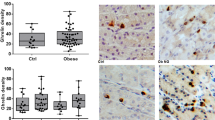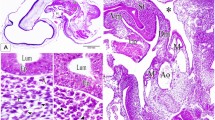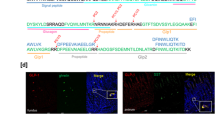Abstract
In rabbits starved for 48 hr. with free access to water, the Golgi apparatus as shown by the Aoyama technique, as modified by me, is in the form of a compact reticulum lying close to the luminal pole of the nucleus (Fig. 1.1). After feeding, the Golgi reticulum expands and increases gradually in volume until it occupies the luminal part of the cytoplasm (Fig. 1.2–4). During increased secretory activity, the power of the Golgi substance to reduce silver nitrate or osmium tetroxide gradually increases; this suggests that besides the morphological changes, chemical changes occur in the Golgi substance. In the fed rabbits, argentophile secretory granules appear in the field of the Golgi apparatus, and as the latter hypertrophies the secretory granules increase in number (Fig. 1.2–3).
This is a preview of subscription content, access via your institution
Access options
Subscribe to this journal
Receive 51 print issues and online access
$199.00 per year
only $3.90 per issue
Buy this article
- Purchase on Springer Link
- Instant access to full article PDF
Prices may be subject to local taxes which are calculated during checkout
Similar content being viewed by others
Author information
Authors and Affiliations
Rights and permissions
About this article
Cite this article
MOUSSA, T. The Golgi Apparatus and Secretion of Enzymes in Peptic Cells of Rabbit. Nature 178, 1002–1003 (1956). https://doi.org/10.1038/1781002a0
Issue Date:
DOI: https://doi.org/10.1038/1781002a0
Comments
By submitting a comment you agree to abide by our Terms and Community Guidelines. If you find something abusive or that does not comply with our terms or guidelines please flag it as inappropriate.



